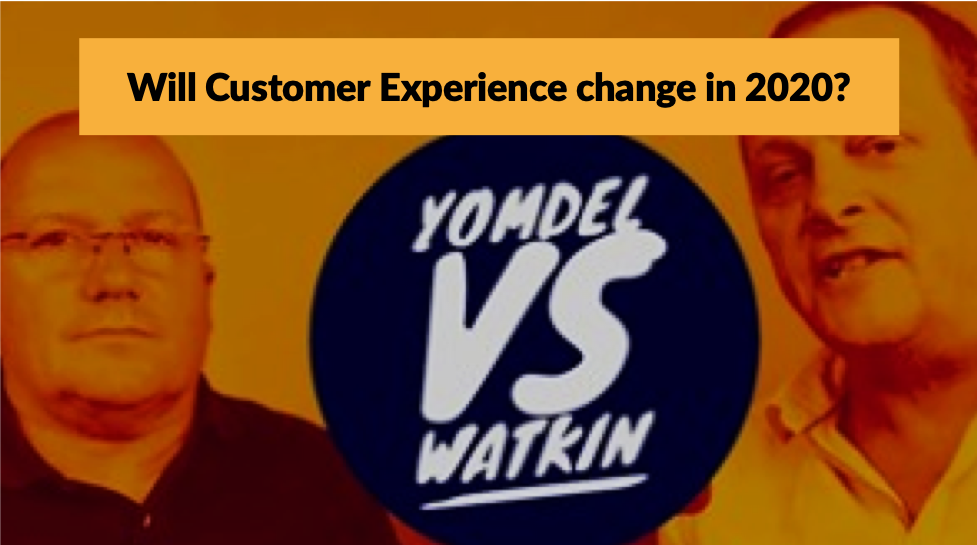In Spring 2019, property market expert and industry correspondent Chris Watkin interviewed Yomdel's founding partners Andy Soloman and Tim Breden. Here we ask - will 2020 be any different?
Watch the video here to see their discussion on the challenges for Estate Agents in particular, of optimising Customer Experience in a constantly evolving and extremely demanding industry.
We're asking ourselves whether we can actually see 2020 being any different. Is there a tipping point even in sight, where Customer Experience is at the core of business growth strategy? We've got some thoughts on that below, after the video:
Have any of those fears and frustrations gone away? A range of very familiar subjects were touched upon in last year's interview, and it's fair to say that every single one of them is still as big a challenge now as it was then. Let's look at some of them:
1. Putting the customer first
The cost vs benefit question that every business faces will never go away. There's never enough money available to invest in perfect service, is usually the response to this challenge. Good has to be good enough, and we do the very best we can.
But this simply isn't true. There are now ways to measure customer service performance, and track the impact that improvement actions have on overall revenue, profitability and repeat business. Putting the customer first requires a mindset in a business, and you only have to look at the best to know that it works. There should always be enough money, where a return can be assured.
Will this change in 2020? Maybe. The first step is mindset - deciding to prioritise investment in customer experience. The second, and crucial step is seeking out help to determine HOW. Businesses that do this will be in a much better position come 2021.
2. Avoiding short-termism
The same cost benefit question faced above, drives a business to demand short-term return every time short term cost is incurred. If I spend it now, I must get the return now. But business change, and customer experience improvement takes time. It must be a part of a training and development programme, underpinned by a constant improvement culture. Again there are dozens of examples where smart businesses have faith and wisdom in this approach, and see greater long-term dividends as a consequence.
If you want to be in business in 2021, you have to look beyond Q1 2020. Yes, this quarter has to work too, but something has to build for the future, or competitors who do take the right approach will leave you behind.
3. Maximising EVERY revenue opportunity
Cross selling ancilliary products, or earning commission from referrals (think mortgages, conveyancing, tenancy insurances, etc) is all too often forgotten in the desperate search for core product sales. It's easy to see why from the two previous points. Sales people are under intense short-term pressure, focused entirely on their own goal rather than the customer's goal, and just don't have the time to remember everything.
Or so they believe. And in truth they need help. Cross-sales and referrals need to be engineered or hard-wired into every business process, and every customer communications journey, so that it isn't left to chance or available time. Customer journey planning and business process engineering are key investments which underpin long-term business performance. And they are a lot less complicated than they sound. With the right facilitator, every business can work through what is required to optimise every stage of their diverse customer journeys.
2020 will potentially see change here, driven by the leaders of the best businesses, and even more so in the new emerging business models, which will reveal to us all how well it can be done when Customer Experience is prioritised.
4. New vs Old : High Street vs Online
This is a red herring! The distinction between traditional and new models is simply a distraction when actually addressing the challenge. There are people who want to buy and sell houses, and there are agents who help them to do this. Go back to Point 1 above, and put the customer first, and realise that they only care about two things: the result; and how the experience made them feel.
Your methodology is ultimately secondary, if it succeeds in delivering the customer's required result, and provides them with an exceptional, positive experience. The real challenge is for businesses over-invested in either end of the old vs new scale, who lack the flexibility to adapt their methodology quickly. And I sympathise with this position enormously, but that is why taking a long-term view as early as possible is crucial for success.
We should see some real lessons in 2020, from successes and failures, which will reveal whether the tipping point is in sight or we have to wait a while longer.
5. Stop own goals - get the basics right
It is astonishing that every year passes by, with the same publicity about poor customer experience, yet little appears to change. I suspect that slowly but surely things do change. But NOT FAST ENOUGH! That's because consumer expectation is rising, and tolerance is falling. So whilst the needle is slowly moving in the right direction, the gap between expectation and reality stays the same.
The businesses that smash the basics - responding to every email, every portal lead, every web enquiry, available in real-time 24/7 etc - and institutionalise great performance on all these fundamentals, will firstly take a big leap forward, but will also develop a long-term growth platform. On this they can build a customer experience strategy, incorporating the above points to even greater success.
2020 will be no different here. This brutal differentiator sorts the wheat from the chaff, and those who get it right will push on. Those who do not will at best merely survive.
Inevitably there is much simplification here, and I'm always happy to expand upon any of these points, as many deserve much more. The video covered a wider variety of points, and we try to cover these in our regular writing:
- walking in your customers' shoes, seeing your business through their eyes
- disconnect between service offered and service expected
- the value of long-term prospect relationships
- the danger of only focusing on immediate high value customers (tenants never get a look in)
Hopefully we can cover these more this year, and I'd love to hear your views on 2020, and how you see it panning out.
If you'd like to know more about how Yomdel could help you, feel free to book a time for a chat:
Simon Taylor is Marketing Director at Yomdel, and can be reached at simon.taylor@yomdel.com






